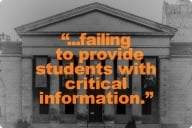You have /5 articles left.
Sign up for a free account or log in.
Before scholarship recipients at Barton College receive money for the spring semester, the advancement office attempts something the students’ mothers have probably failed at numerous times – getting them to write thank-you notes.
Of course, Barton has a bargaining chip. The scholarship money is withheld until the letters are in the mail. That makes students show up, said Raymond E. Carnley, Barton’s director of development.
Colleges and universities often push recipients of endowed scholarships and others who benefit from donations to thank benefactors, but it has rarely been mandatory. Now that budgets are tight and fund-raising is difficult, however, some see compulsory thank-you notes as a tool to help ensure that donors stay connected to the college and see the benefits of their contributions, potentially leading to future donations. Others see the letters that would come from such a requirement as too formulaic to do any good.
Either way, numerous advancement officers said it can't hurt a college to teach some manners to a generation of students unaccustomed to sending thank-you notes.
Advancement officers frame the policy as part fund-raising strategy, part education. Donors who feel connected to the college are more likely to continue to give, these officers say, and they love hearing from students.
"For us it is the first piece of stewardship and starting the next cultivation so people make an additional gift down the road," Carnley said. "Family or whoever is connected to the scholarship can see firsthand the difference their gift is making."
He said the college has long required students to write the notes to benefactors, but only recently made the reception of funds contingent on their doing so. This way the students come to them, instead of the office having to track them down.
Most often the return on such letters comes slowly if it comes at all, advancement officials said, and the notes are only a small component of broader advancement strategies. But occasionally, letters that talk about students’ financial position, the benefit of the scholarship, or their experience at college can motivate a person to donate on the spot.
"We’ve gotten donations after we’ve sent out thank-you letters," said Saskia DeCaires, director of donor relations for St. John's University, in New York. "People will say, 'I want to increase my gift this year, I was really moved by Tom’s letter.' "
Six years ago, DeCaires, along with the financial aid office, instituted a system at St. John's that made students' scholarship funds contingent on a thank-you letter. The university pulls the scholarship money from the student’s account if he or she does not write it in a timely manner. Before that, she said, she would solicit letters from the school’s more than 1,000 endowed-scholarship recipients and get about 30. Once students started seeing the money they thought they had received disappear, they showed up in droves.
Barton has a similar system, though all students receive scholarship money for the fall semester and then are asked to go by the advancement office to write the notes. If they are not completed by the spring semester, the student is denied the money for that semester. Once the students complete the letters, the spring scholarship money is restored. Unlike St. John's, which can actually pull the scholarship, Barton would not take a away the scholarship of a student who does not to write a letter, and he or she would still receive it the next fall. But that has never been a problem. "We've never had a student not willing to write the note," Carnley said. "It just takes us reminding them."
At La Sierra University, the scholarship application states that, upon accepting the scholarship, a student will be required to write a thank-you note and attend a luncheon for donors and recipients. If a student does not write the note, the university sends him reminder e-mails. Carol Bradfield, associate vice president for advancement, said the college gives endowed scholarship money to about 140 students a year, and has never had to deny a student a scholarship solely on the grounds of not writing a letter.
There is some debate about whether requiring the students to write the letters does any good. Officials at colleges that don’t mandate thank-you notes said the best letters are motivated by actual gratitude, not by a requirement. Mandatory letters can come off looking formulaic.
"We believe that these letters are best when asked for rather than mandated," said Julie Martel, stewardship officer at Hampshire College. "The tone of the letters is honest, celebratory, and personal, which would not be the case if they were demanded rather than volunteered."
Martel said Hampshire encourages scholarship recipients to write letters, and sends out e-mails reminding them, but do not demand that they do so. She said most students who are asked to write letters do so.
Officials at St. Johns, Barton, and La Sierra all said they have seen no drawbacks to the mandatory letters, and recommend the strategy to other colleges and universities. In the best-case scenario, a student who didn’t actually think of writing a letter learns a little bit and writes a great letter. The worst that happens, they said, is that a donor gets a formulaic thank-you note that still expresses some gratitude and reminds them of the college.
“I’ve never had a donor not want a thank-you note because it was required,” Bradfield said. “Even if it doesn’t mean as much, they’re still happy to have them.”
In addition to using the letters as a fund-raising tool, administrators often see them as an opportunity to teach students how to write a thank-you note, and to instill a sense of gratitude. Even at many colleges that don’t mandate letters, officials have created programs to educate students on writing them.
Some colleges host thank-you-note workshops where they will bring in large groups of students and provide lunch or dinner. Other advancement officers open their offices for one-on-one training. Officials said many students have come into their offices unaware of what should go into such a letter. Most offices suggest that students talk a little bit about themselves, such as what they’re studying, their extracurricular activities, and how the scholarship has helped them. Bradfield said La Sierra provides some “simple language” on which students can elaborate.
St. John's sends students to the college's writing center, which DeCaires said serves two missions: the employees there help improve the quality of the students' letters, and the center gets students in the door, making them more likely to return in the future.
Advancement officers hope that students will get a better understanding of philanthropy and possibly donate in the future. “We feel that it's part of the students’ education about how to be a good citizen, part of their philanthropic education,” Bradfield said.
DeCaires said before she imposed the letter-writing requirement, a lot of students didn’t understand that the scholarship money came from an actual person. She said she hopes that, in writing the letters, students come to understand that they, too, could help a student go to college.








